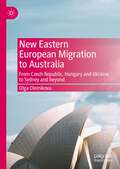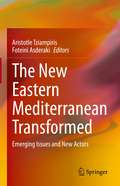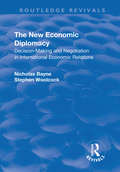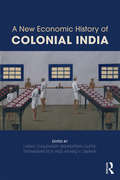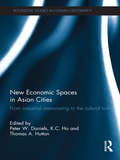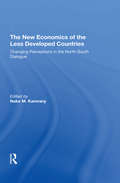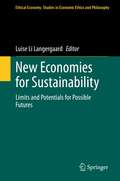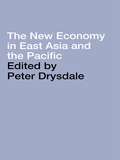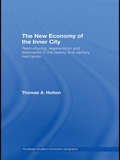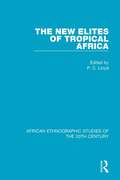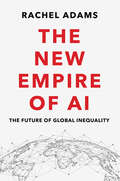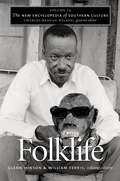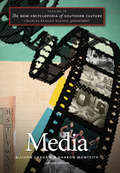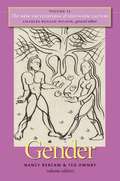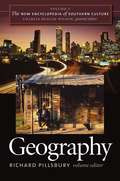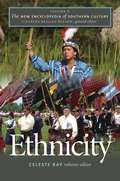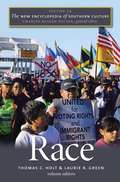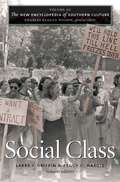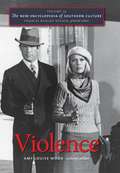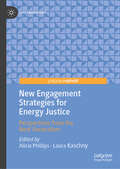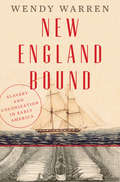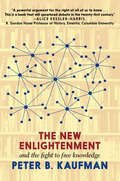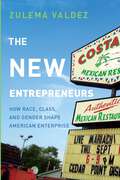- Table View
- List View
New Eastern European Migration to Australia: From Czech Republic, Hungary and Ukraine to Sydney and beyond
by Olga OleinikovaThis book identifies and examines new forms and paths of Eastern European migration to Australia since the 2000s, and provides updated trends of contemporary migration movements of Ukrainians, Hungarians and Czechs to Australia. With chapters highlighting the diversities and complexities of these new accelerated waves of Eastern European migration to Asia-Pacific, this book offers novel insights to enrich our understanding of East European mobility in the 21st century. The book will appeal to students, scholars and policymakers in the fields of migration, sociology, political science and international relations.
The New Eastern Mediterranean Transformed: Emerging Issues and New Actors
by Aristotle Tziampiris Foteini AsderakiThis collective volume examines the evolving political dynamics of the Eastern Mediterranean. Recently, both the opportunities, such as the energy resources, and the challenges, such as the enormous migration flows, have caught the international attention since they have redefined the balance of powers in the area. This volume assembles the analyses of acknowledged scholars and academics from the Eastmed countries, who assess the most fundamental developments of the region in a comprehensive manner, underscoring the significance of the Eastern Mediterranean for the world politics. The book focuses on readers and parties primarily at European level/ EU affiliated, interested in national, regional, EU or international aspects of the Eastern Mediterranean area, such as politics, security, migration governance and energy developments on regional and EU level.
The New Economic Diplomacy: Decision Making and Negotiation in International Economic Relations (Routledge Revivals)
by Matthew Goodman Nicholas Bayne Stephen Woolcock Phil Evans Colin Budd Patrick Rabe Ivan Mbirimi Nigel Wicks Richard CardenThis title was first published in 2003. This text explains how states conduct their external economic relations as the 21st century begins: how they make decisions domestically; how they negotiate internationally; and how these processes interact. It documents the transformation of economic diplomacy in response to the end of the Cold War, the advance of globalisation and the terrorist attacks of September 2001 and illustrates the growing influence of non-state actors like private business and civil society. The book integrates a full academic and theoretical analysis with the experience of senior practitioners in economic diplomacy and is based on the authors' work in the LSE's graduate programme on "The Politics of the World Economy".
A New Economic History of Colonial India
by Latika Chaudhary, Bishnupriya Gupta, Tirthankar Roy and Anand V. SwamyA New Economic History of Colonial India provides a new perspective on Indian economic history. Using economic theory and quantitative methods, it shows how the discipline is being redefined and how new scholarship on India is beginning to embrace and make use of concepts from the larger field of global economic history and economics. The book discusses the impact of property rights, the standard of living, the labour market and the aftermath of the Partition. It also addresses how education and work changed, and provides a rethinking of traditional topics including de-industrialization, industrialization, railways, balance of payments, and the East India Company. Written in an accessible way, the contributors – all leading experts in their fields – firmly place Indian history in the context of world history. An up-to-date critical survey and novel resource on Indian Economic History, this book will be useful for undergraduate and postgraduate courses on Economic History, Indian and South Asian Studies, Economics and Comparative and Global History.
New Economic Spaces in Asian Cities: From Industrial Restructuring to the Cultural Turn (Routledge Studies in Human Geography)
by Peter W. Daniels K. C. Ho Thomas A. HuttonThe East and Southeast Asia region constitutes the world’s most compelling theatre of accelerated globalization and industrial restructuring. Following a spectacular realization of the ‘industrialization paradigm’ and a period of services-led growth, the early twenty-first century economic landscape among leading Asian states now comprises a burgeoning ‘New Economy’ spectrum of the most advanced industrial trajectories, including finance, the knowledge economy and the ‘new cultural economy’. In an agenda-setting volume, New Economic Spaces in Asian Cities draws on stimulating research conducted by a new generation of urban scholars to generate critical analysis and theoretical insights on the New Economy phenomenon within Asia. New industry formation and the transformation of older economic practices constitute instruments of development, as well as signifiers of larger processes of change, expressed in the reproduction of space in the city. Asia’s major cities become the key staging areas for the New Economy, driven by the growing wealth of an urban middle and professional class, higher education institutions, city-based inter-regional movements and urban mega-projects. New Economic Spaces in Asian Cites animates this New Economy discourse by means of vibrant storylines of instructive cities and sites, including cases studies situated in cities such as Tokyo, Seoul, Shanghai, Beijing, Shenzhen, and Singapore. Theoretical and normative issues associated with the emergence of the new cultural economy are the subject of the book’s context-setting chapters, and each case study presents an evocative narrative of development interdependencies and exemplary outcomes on the ground. New Economic Spaces in Asian Cities offers a vivid contribution to our understanding of the ongoing transformation of Asia’s urban system, including the critical intersections of global and local-regional dynamics in processes of new industry formation and the relayering of space in the Asian metropolis. The synthesis of empirical profiles, normative insights, and theoretical reference points enhances the book’s interest for scholars and students in fields of Asian studies, urban and cultural studies, and urban and economic geography, as well as for policy specialists and urban/community planners.
The New Economics Of The Less Developed Countries: Changing Perceptions In The North-south Dialogue
by Nake KamranyAfter a quarter-century of experimentation with economic development in the poorer countries, the disarray, and in some cases the calamitous results, are so obvious that a fresh look at and reexamination of traditional assumptions, methodologies, theories, and policies is needed. The contributors to this volume explore—with supporting theoretical frameworks and emipirical evidence—the new perceptions concerning the development of the poor countries, providing clear and sophisticated treatments of North-South bargaining, commodity power, indexation, the theory of power and the international distribution of rights and resources, and the effectiveness of international organizations as vehicles for conflict resolution. The authors discuss the position and prospects of the non-oil-producing, less developed countries, focusing on measurements of the quality of life in these countries, growth and income distribution policies, and the effectiveness of public expenditures to enhance social welfare.
New Economies for Sustainability: Limits and Potentials for Possible Futures (Ethical Economy #59)
by Luise Li LangergaardThe edited volume New Economies for Sustainability: Limits and Potentials for Possible Futures brings together a range of alternative views on economy and organization to illustrate different perspectives on how to work towards more sustainable solutions to production, consumptions and economic organization more generally. The book brings chapters from the most renowned scholars in the field, who bring their perspectives on how alternative schools theorize politics, society, organization, nature and ethics in their attempts to develop theories with a strong focus on sustainability. The book aims to contribute with a platform for gathering and collecting these theories in a pluralist economic framework, which can provide a strong alternative voice to mainstream economic theories in sustainability debates.
The New Economy in East Asia and the Pacific (PAFTAD (Pacific Trade and Development Conference Series) #10)
by Peter DrysdaleThis book sets out the problems of measuring the effects of technological change on economic progress by using the internet in the Asia-Pacific region as a case study. Corporate and industry experience, including changing business organization and new regulatory issues are explored as well as policy issues such as the digital divide and the approach to e-commerce in the WTO. Using several industry case studies the contributors compare the IT experience in North America with a number of countries in Asia and the Pacific.
The New Economy of the Inner City: Restructuring, Regeneration and Dislocation in the 21st Century Metropolis (Routledge Studies in Economic Geography)
by Thomas A. HuttonFollowing the restructuring process which swept away the traditional manufacturing economy of the inner city 25 years ago, new industries are transforming these former post-industrial landscapes. These creative, technology-intensive industries include Internet services, computer graphics and imaging, and video game production. The development dynamics of these new sectors are volatile in comparison with those of the classic ‘Industrial City’. But these new industries highlight the unique role of the inner city in facilitating creative processes, innovation and social change. Further, they reflect the intensity of interaction between the ‘global’ and the ‘local’ in the metropolis, and represent key agencies of urban place-making and re-imaging. This book addresses the critical intersections between process and place which underpin the formation of creative enterprises in the emergent industrial districts of the ‘new inner city’. It contains intensive case studies of industrial restructuring within exemplary sites in prominent world cities such as London, Singapore, San Francisco and Vancouver. The studies demonstrate the global reach of development and innovation across these cities and sites, marked by clustering, rapid firm turnover, and interdependency between production and consumption activity. The evocative case studies, brought to life by interviews, sequential mapping exercises, media narratives, and photography, also disclose the importance of local factors (including urban scale, built form, property markets and policy) which shape both the specific industrial structures and socio-economic impacts. The New Economy of the Inner City places inner city new industry formation within the development history of the city, and underscores its role in larger processes of urban transformation. The findings inform a critique and synthesis of urban theory which frame the evolving conditions of the 21st century metropolis. This book would be useful to researchers and students of Geography, Urban Studies, Economics and Planning.
The New Elites of Tropical Africa
by P. C. LloydOriginally published in 1966, this book brings together papers dealing with the emergence and development of elites in sub-Saharan Africa among social categories ranging from farmers and women market traders through foremen and merchants to administrators and managers in government and industry. The authors analyse distinctive social characteristics and attitudes and the development of class consciousness.
The New Empire of AI: The Future of Global Inequality
by Rachel AdamsAs AI takes hold across the planet and wealthy nations seek to position themselves as global leaders of this new technology, the gap is widening between those who benefit from it and those who are subjugated by it. As Rachel Adams shows in this hard-hitting book, growing inequality is the single biggest threat to the transformative potential of AI. Not only is AI built on an unequal global system of power, it stands poised to entrench existing inequities, further consolidating a new age of empire. AI’s impact on inequality will not be experienced in poorer countries only: it will be felt everywhere. The effects will be seen in intensified international migration as opportunities become increasingly concentrated in wealthier nations; in heightened political instability and populist politics; and in climate-related disasters caused by an industry blind to its environmental impact across supply chains. We need to act now to address these issues. Only if the current inequitable trajectory of AI is halted, the incentives changed and the production and use of AI decentralized from wealthier nations will AI be able to deliver on its promise to build a better world for all.
The New Encyclopedia of Southern Culture: Folklife
by William Ferris Glenn HinsonSouthern folklife is the heart of southern culture. Looking at traditional practices still carried on today as well as at aspects of folklife that are dynamic and emergent, contributors to this volume of The New Encyclopedia of Southern Culture examine a broad range of folk traditions. Moving beyond the traditional view of folklore that situates it in historical practice and narrowly defined genres, entries in this volume demonstrate how folklife remains a vital part of communities' self-definitions. Fifty thematic entries address subjects such as car culture, funerals, hip-hop, and powwows. In 56 topical entries, contributors focus on more specific elements of folklife, such as roadside memorials, collegiate stepping, quinceanera celebrations, New Orleans marching bands, and hunting dogs. Together, the entries demonstrate that southern folklife is dynamically alive and everywhere around us, giving meaning to the everyday unfolding of community life.
The New Encyclopedia of Southern Culture: Media
by Allison Graham Sharon MonteithThis volume ofThe New Encyclopedia of Southern Cultureexamines how mass media have shaped popular perceptions of the South--and how the South has shaped the history of mass media. An introductory overview by Allison Graham and Sharon Monteith is followed by 40 thematic essays and 132 topical articles that examine major trends and seminal moments in film, television, radio, press, and Internet history. Among topics explored are the southern media boom, beginning with the Christian Broadcast Network and CNN; popular movies, television shows, and periodicals that have shaped ideas about the region, includingGone with the Wind,The Beverly Hillbillies,Roots, andSouthern Living; and southern media celebrities such as Oprah Winfrey, Truman Capote, and Stephen Colbert. The volume details the media's involvement in southern history, from depictions of race in the movies to news coverage of the civil rights movement and Hurricane Katrina. Taken together, these entries reveal and comment on the ways in which mass media have influenced, maintained, and changed the idea of a culturally unique South.
The New Encyclopedia of Southern Culture: Gender
by Ted Ownby Nancy BercawThis volume of The New Encyclopedia of Southern Culture reflects the dramatic increase in research on the topic of gender over the past thirty years, revealing that even the most familiar subjects take on new significance when viewed through the lens of gender. The wide range of entries explores how people have experienced, understood, and used concepts of womanhood and manhood in all sorts of obvious and subtle ways.The volume features 113 articles, 65 of which are entirely new for this edition. Thematic articles address subjects such as sexuality, respectability, and paternalism and investigate the role of gender in broader subjects, including the civil rights movement, country music, and sports. Topical entries highlight individuals such as Oprah Winfrey, the Grimke sisters, and Dale Earnhardt, as well as historical events such as the capture of Jefferson Davis in a woman's dress, the Supreme Court's decision in Loving v. Virginia, and the Memphis sanitation workers' strike, with its slogan, "I AM A MAN." Bringing together scholarship on gender and the body, sexuality, labor, race, and politics, this volume offers new ways to view big questions in southern history and culture.
The New Encyclopedia of Southern Culture: Geography
by Richard PillsburyThe location of "the South" is hardly a settled or static geographic concept. Culturally speaking, are Florida and Arkansas really part of the same region? Is Texas considered part of the South or the West? This volume of The New Encyclopedia of Southern Culture grapples with the contestable issue of where the cultural South is located, both on maps and in the minds of Americans. Richard Pillsbury's introductory essay explores the evolution of geographic patterns of life within the region--agricultural practices, urban patterns, residential buildings, religious preferences, foodways, and language. The entries that follow address general topics of cultural geographic interest, such as Appalachia, exiles and expatriates, Latino and Jewish populations, migration patterns, and the profound Disneyfication of central Florida. Entries with a more concentrated focus examine major cities, such as Atlanta, New Orleans, and Memphis; the influence of black and white southern migrants on northern cities; and individual subregions, such as the Piedmont, Piney Woods, Tidewater, and Delta. Putting together the disparate pieces that make up the place called "the South," this volume sets the scene for the discussions in all the other volumes of The New Encyclopedia of Southern Culture.
The New Encyclopedia of Southern Culture: Ethnicity
by Celeste RayTranscending familiar categories of "black" and "white," this volume of The New Encyclopedia of Southern Culture complicates and enriches our understanding of "southernness" by identifying the array of cultures that combined to shape the South. This exploration of southern ethnicities examines the ways people perform and maintain cultural identities through folklore, religious faith, dress, music, speech, cooking, and transgenerational tradition.Accessibly written and informed by the most recent research that recovers the ethnic diversity of the early South and documents the more recent arrival of new cultural groups, this volume greatly expands upon the modest Ethnic Life section of the original Encyclopedia. Contributors describe 88 ethnic groups that have lived in the South from the Mississippian Period (1000-1600) to the present. They include 34 American Indian groups, as well as the many communities with European, African, and Asian cultural ties that came to the region after 1600. Southerners from all backgrounds are likely to find themselves represented here.
The New Encyclopedia of Southern Culture: Race
by Charles Reagan Wilson Laurie B. Green Thomas C. HoltThere is no denying that race is a critical issue in understanding the South. However, this concluding volume of The New Encyclopedia of Southern Culture challenges previous understandings, revealing the region's rich, ever-expanding diversity and providing new explorations of race relations. In 36 thematic and 29 topical essays, contributors examine such subjects as the Tuskegee Syphilis Study, Japanese American incarceration in the South, relations between African Americans and Native Americans, Chinese men adopting Mexican identities, Latino religious practices, and Vietnamese life in the region. Together the essays paint a nuanced portrait of how concepts of race in the South have influenced its history, art, politics, and culture beyond the familiar binary of black and white.
The New Encyclopedia of Southern Culture: Social Class
by Charles Reagan Wilson Larry J. Griffin Peggy G. HargisThis volume of The New Encyclopedia of Southern Culture offers a timely, authoritative, and interdisciplinary exploration of issues related to social class in the South from the colonial era to the present. With introductory essays by J. Wayne Flynt and by editors Larry J. Griffin and Peggy G. Hargis, the volume is a comprehensive, stand-alone reference to this complex subject, which underpins the history of the region and shapes its future.In 58 thematic essays and 103 topical entries, the contributors explore the effects of class on all aspects of life in the South--its role in Indian removal, the Civil War, the New Deal, and the civil rights movement, for example, and how it has been manifested in religion, sports, country and gospel music, and matters of gender. Artisans and the working class, indentured workers and steelworkers, the Freedmen's Bureau and the Knights of Labor are all examined. This volume provides a full investigation of social class in the region and situates class concerns at the center of our understanding of Southern culture.
The New Encyclopedia of Southern Culture: Violence
by Amy Louise WoodMuch of the violence that has been associated with the United States has had particular salience for the South, from its high homicide rates, or its bloody history of racial conflict, to southerners' popular attachment to guns and traditional support for capital punishment. With over 95 entries, this volume of The New Encyclopedia of Southern Culture explores the most significant forms and many of the most harrowing incidences of violence that have plagued southern society over the past 300 years. Following a detailed overview by editor Amy Wood, the volume explores a wide range of topics, such as violence against and among American Indians, labor violence, arson, violence and memory, suicide, and anti-abortion violence. Taken together, these entries broaden our understanding of what has driven southerners of various classes and various ethnicities to commit acts of violence, while addressing the ways in which southerners have conceptualized that violence, responded to it, or resisted it. This volume enriches our understanding of the culture of violence and its impact on ideas about law and crime, about historical tradition and social change, and about race and gender--not only in the South but in the nation as a whole.
New Engagement Strategies for Energy Justice: Perspectives from the Next Generation (Just Transitions)
by Alicia Phillips Laura KaschnyThis book offers an innovative exploration of energy justice, from concept to action, highlighting its role as a crucial tool for navigating the complexities of a just and sustainable energy transition. The book is timely and as the global energy transition rapidly progresses, it will serve as an essential resource, offering practical guidance to advancing a just and sustainable energy future. The perspectives presented in this book are presented by early career energy justice scholars from around the world, each highlighting and proposing ways to navigate the transition. The discussion focuses on three key themes: the integration and repurposing of energy infrastructures with the use of technology, the need for affordable and accessible energy services, and the promotion of responsible governance through effective policymaking and corporate social responsibility. At the heart of this book is the presentation of the ‘Toolkit to Achieve the Just Transition using the Energy Justice Framework’.
New England Bound: Slavery And Colonization In Early America
by Wendy WarrenThe most important work on seventeenth-century New England in a generation. In the tradition of Edmund S. Morgan, whose American Slavery, American Freedom revolutionized colonial history, a new generation of historians is fundamentally rewriting America's beginnings. Nowhere is this more evident than in Wendy Warren's explosive New England Bound, which reclaims the lives of so many long-forgotten enslaved Africans and Native Americans in the seventeenth century. Based on new evidence, Warren links the growth of the northern colonies to the Atlantic slave trade, demonstrating how New England's economy derived its vitality from the profusion of slave-trading ships coursing through its ports. Warren documents how Indians were systematically sold into slavery in the West Indies and reveals how colonial families like the Winthrops were motivated not only by religious freedom but also by their slave-trading investments. New England Bound punctures the myth of a shining "City on a Hill," forcefully demonstrating that the history of American slavery can no longer confine itself to the nineteenth-century South.
A New England Girlhood, Outlined from Memory (Beverly, MA)
by Lucy LarcomArriving in Lowell, Massachusetts, in the 1830s after the death of her shipmaster father, the eleven-year-old Lucy Larcom went to work in a textile mill to help her family make ends meet. <P> <P> Originally published in 1889, her autobiography offers glimpses of the early years of the American factory system as well as of the social influences on her development. It remains an important and illuminating document of the Industrial Revolution and nineteenth-century cultural history.
The New Enlightenment and the Fight to Free Knowledge
by Peter B. KaufmanHow do we create a universe of truthful and verifiable information, available to everyone?In The New Enlightenment and the Fight to Free Knowledge, MIT Open Learning&’s Peter B. Kaufman describes the powerful forces that have purposely crippled our efforts to share knowledge widely and freely.Popes and their inquisitors, emperors and their hangmen, commissars and their secret police—throughout history, all have sought to stanch the free flow of information. Kaufman writes of times when the Bible could not be translated—you&’d be burned for trying; when dictionaries and encyclopedias were forbidden; when literature and science and history books were trashed and pulped—sometimes along with their authors; and when efforts to develop public television and radio networks were quashed by private industry.In the 21st century, the enemies of free thought have taken on new and different guises—giant corporate behemoths, sprawling national security agencies, gutted regulatory commissions. Bereft of any real moral compass or sense of social responsibility, their work to surveil and control us are no less nefarious than their 16th- and 18th- and 20th- century predecessors. They are all part of what Kaufman calls the Monsterverse.The New Enlightenment and the Fight to Free Knowledge maps out the opportunities to mobilize for the fight ahead of us. With the Internet and other means of media production and distribution—video especially—at hand, knowledge institutions like universities, libraries, museums, and archives have a special responsibility now to counter misinformation, disinformation, and fake news—and especially efforts to control the free flow of information. A film and video producer and former book publisher, Kaufman begins to draft a new social contract for our networked video age. He draws his inspiration from those who fought tooth and nail against earlier incarnations of the Monsterverse—including William Tyndale in the 16th century; Denis Diderot in the 18th; untold numbers of Soviet and Central and East European dissidents in the 20th—many of whom paid the ultimate price. Their successors? Advocates of free knowledge like Aaron Swartz, of free software like Richard Stallman, of an enlightened public television and radio network like James Killian, of a freer Internet like Tim Berners-Lee, of fuller rights and freedoms like Edward Snowden. All have been striving to secure for us a better world, marked by the right balance between state, society, and private gain. The concluding section of the book, its largest piece, builds on their work, drawing up a progressive agenda for how today&’s free thinkers can band together now to fight and win. With everything shut and everyone going online, The New Enlightenment and the Fight to Free Knowledge is a rousing call to action that expands the definition of what it means to be a citizen in the 21st century.
The New Entrepreneurs
by Jon KraszewskiAccording to the sociologist C. Wright Mills in his 1951 book, White Collar: The American Middle Classes, the "new entrepreneur" was a lone wolf able to succeed in post-World War II corporate America by elusively meandering through various institutions. During this time, anthology writers such as Rod Serling, Reginald Rose, and Paddy Chayefsky achieved a level of creativity that has rarely been equaled on television since. Yet despite their success, anthology writers still needed to evade the constraints and censorship of 50s television in order to stay true to their creative powers and political visions. Thus they worked as new entrepreneurs who adapted their more controversial scripts for the Hollywood, Broadway, and book publishing industries. Even after the television networks cancelled their prestigious anthology series at the end of the 50s, the most resilient writers were able to redefine what it meant to be entrepreneurs by launching cutting-edge shows such as The Twilight Zone and The Defenders that are still popular today. The New Entrepreneurs includes detailed textual analysis of legendary, sometimes hard-to-find, television anthology scripts that have received only cursory glances in television history until now.
The New Entrepreneurs: How Race, Class, and Gender Shape American Enterprise
by Zulema ValdezFor many entrepreneurs, the American Dream remains only partially fulfilled. Unequal outcomes between the middle and lower classes, men and women, and Latino/as, whites, and blacks highlight continuing inequalities and constraints within American society. With a focus on a diverse group of Latino entrepreneurs, this book explores how class, gender, race, and ethnicity all shape Latino entrepreneurs' capacity to succeed in business in the United States. Bringing intersectionality into conversation with theories of ethnic entrepreneurship, Zulema Valdez considers how various factors create, maintain, and transform the social and economic lives of Latino entrepreneurs. While certain group identities may impose unequal, if not discriminatory, starting positions, membership in these same social groups can provide opportunities to mobilize resources together. Valdez reveals how Latino entrepreneurs-as members of oppressed groups on the one hand, yet "rugged individualists" striving for the American Dream on the other-work to recreate their own positions within American society.
